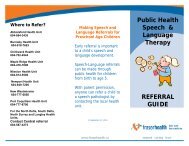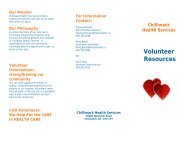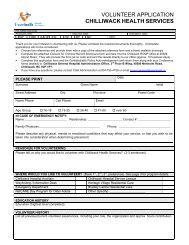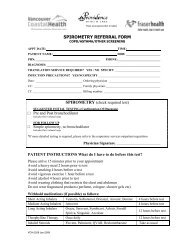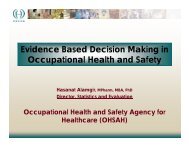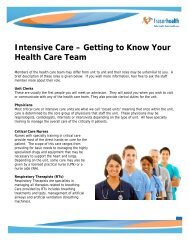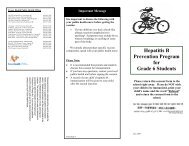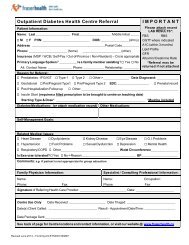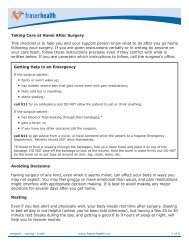Let's Keep You Home - Fraser Health Authority
Let's Keep You Home - Fraser Health Authority
Let's Keep You Home - Fraser Health Authority
Create successful ePaper yourself
Turn your PDF publications into a flip-book with our unique Google optimized e-Paper software.
Let’s <strong>Keep</strong><strong>You</strong> <strong>Home</strong>Sleep in yourown bed…have a nap in yourfavourite chair…eat at yourown table<strong>Fraser</strong> <strong>Health</strong> <strong>Home</strong> <strong>Health</strong>knows that home is the bestplace to be. With a bit of help,even with a chronic conditionor age-related issues, you shouldbe able to live on your own.We can help you stay home bysetting you up with the supportyou need to be independent foras long as possible.<strong>Home</strong> isthe best placeto be…
We know that most people want to live intheir own homes for as long as possible. Infact, eight out of 10 <strong>Fraser</strong> <strong>Health</strong> seniors whoare over age 85 live in their own homes.The health care system is listening to thestrong desire by seniors to live in their ownhome as long as possible. <strong>Fraser</strong> <strong>Health</strong> isdeveloping more services in the communityto help older adults stay healthy, stay out ofhospital and stay at home.On the following pages, we have providedsome advice for you and your family to helpyou stay home as long as possible, or returnhome as soon as possible if a hospital staybecomes necessary.2
Marjorie’s Story‘Marjorie’ is a lively80-year-old with a historyof rheumatoid arthritiswho lived on her ownwith her pet cat. Shehas a community healthworker from <strong>Fraser</strong><strong>Health</strong> <strong>Home</strong> <strong>Health</strong>come in once a week to help her as she is a bitunsteady in the shower and nervous about falling.One day she had a stroke at home. She had theLifeline service and was able to call for helpand an ambulance took her to the Emergencydepartment of a nearby hospital. Her daughter‘Sara’ was called and arrived right away.The team of nurses and doctors and other healthcare professionals treated Marjorie in Emergencyuntil she was stable. She then waited for a bedin the hospital. After two weeks of treatment,Marjorie was medically stable but the stroke hadleft her with the use of only one hand and arm.Her daughter Sara wondered if Marjorie shouldgo to a residential care facility. She worried abouthow her mother would be able to stay at homeHOME IS BEST 1
alone. But Marjorie insisted she wanted to gohome. Her care team knew she would need a lotof help to get around as well as to prepare meals.But they assured Sara that Marjorie could becared for at home, where she wanted to be, so herdaughter could respect her Mom’s wishes withpeace of mind.Preparations began and the community teamwent into action. The community rehabilitationstaff did a home assessment and recommendedadaptive devices to help Marjorie get on andoff the toilet and move safely throughout herhome. Marjorie would also be attending anoutpatient rehab program at her local hospitaluntil she could attend the exercise program at thecommunity centre.Marjorie was discharged home after a twoweekhospital stay. She was thrilled to be in herown home and see her cat again. A communityhealth worker came to her house every day toassist her with the activities of daily living suchas bathing, grooming and dressing. Sara saw toit that the freezer was stocked with microwaved“home cooked meals” purchased from a privatecompany, fresh produce was delivered by a localsupermarket weekly, and she arranged for a2 HOME IS BEST
housekeeper to clean twice a month. A <strong>Home</strong><strong>Health</strong> case manager was assigned to Marjorie(and Sara) to coach them on how to manageMarjorie’s chronic disease and support her careneeds at home by accessing the necessary servicesas needed. The case manager was also able toadjust the level of support provided by thecommunity health worker as Marjorie recoveredand her care needs changed.Marjorie was ableto live at homefor two moreyears until shecould no longermanage safely.She was assessedat home forpublicly funded residential care and her daughterhelped to move Marjorie and then to sell herhome and belongings according to plans they hadmade together.HOME IS BEST 3
What kind of support isavailable from <strong>Fraser</strong> <strong>Health</strong>?• Regular visits by a community health workerto provide personal care such as assistancewith bathing, toileting, grooming, or dressingand helping you manage your medications, ifnecessary• Assistance with caring for post-surgery woundsby a nurse, either at home or in a communityclinic• Visits by a community health worker to givea breather to family members who may beproviding some of your care4 HOME IS BEST
• Referral to a day programin the community, wherea variety of activities takeplace in a group setting• Continuing rehabilitationthrough short-term inhomephysiotherapy oroccupational therapy, oroutpatient services, orreferral to private clinicsin the community• Assessment by a <strong>Home</strong><strong>Health</strong> occupationalor physical therapist with recommendationsfor equipment and/or exercises to help youperform everyday tasks like toileting, bathing,grooming or getting about your home• Referral to the Red Cross <strong>Health</strong> EquipmentLoan Program to borrow a bath seat, walker,wheelchair or other necessary equipment fora short time if you can’t afford to rent from aprivate vendorHOME IS BEST 5
Other sources of supportWhat kind of support is available from yourfamily/friends and local community organizations(non-profit and private)?• Meal programs such as Meals on Wheels,frozen meal delivery programs• Subscription to Lifeline, a personal emergencyresponse system with help available at the pushof a button• <strong>You</strong>r pharmacy can “blister-pack” yourmedications to make it easier for you to knowwhich pills to take each day• Visits from local support networks of family,friends and neighbours to check that yougather your mail daily or help you clear snowfrom a sidewalk. We all have a role to play asa caring community• Private housekeeping services (can be found inthe Yellow Pages, on the Internet or bulletinboards at local seniors’ centres)If you feel you need additional supports to stayhealthy at home, or if your medical conditionchanges, call your doctor’s office or call 8-1-1 tothe BC Nurseline. Also, let your case managerknow as soon as possible as he or she may adjustyour services to help you through a rough patch.6 HOME IS BEST
How much do<strong>Home</strong> <strong>Health</strong> careservices cost?Depending on your income,there may be a charge forhome support servicessupplied by <strong>Fraser</strong> <strong>Health</strong> orone of its affiliated agencies.There are no charges forprofessional services such asnursing, case management, occupational therapy,or physiotherapy provided by <strong>Fraser</strong> <strong>Health</strong>.<strong>Home</strong> support, which refers to care of a person’sintimate needs such as bathing, dressing andgrooming, may be provided on either a shortterm, or long term basis:• Short-Term Care services provide homesupport when there is a time-limited need forit – for example, after emergency hip surgery tohelp with personal care, or when a client is atend of life. There is no charge for this service.If your care needs become chronic and requireongoing home support, you will need longtermcare service.• Long-Term Care services provide homesupport for clients with ongoing care needsHOME IS BEST 7
and may be subject to acharge. Client costs arebased on client/spousalincome and calculatedas a per-day-of-service<strong>Home</strong> Support rate.Some clients with highcharges may choose topurchase home supportcare privately as it can cost less than payingthe assessed <strong>Home</strong> Support rate. Low-incomeclients will pay a small amount or nothing. Ifa client has a temporary situation which posesa serious financial hardship, <strong>Fraser</strong> <strong>Health</strong>has a process whereby a client (with their casemanager’s help) can apply to be considered fora temporary rate reduction.8 HOME IS BEST
If you need to visit the hospitalIf you feel you need to visit the EmergencyDepartment, you may meet with a <strong>Home</strong> <strong>Health</strong>team member called a Quick Response CaseManager. His or her job is to help you to returnhome with the supports you need, after thedoctor has seen you and determined that you willrecover from your illness more safely at home. TheQuick Response Case Manager will check in onyou over the next two weeks to make sure yourhealth is improving and will connect you withother members of the <strong>Home</strong> <strong>Health</strong> team such ascommunity health workers or physiotherapists ifyou need them.But sometimes you cannot avoid being admittedto hospital for treatment. When you are admitted,the health care team will work with you and yourfamily to begin planning for your discharge. Theywill be checking your progress every day and willprovide an estimated date of discharge.We know that the longer a senior stays in a hospitalbed, the more likely it is that he or she may:• lose the ability to walk as well as before• fall in the unfamiliar setting• lose the ability to think as well as beforeHOME IS BEST 9
• lose general muscle tone, strength and energy• acquire an infectionTherefore, your goal should be to go home assoon as your health care team assures you that theacute phase of your illness is over. Regaining yourstrength and energy may take longer, especiallyif you are a senior with chronic conditions.Sometimes you may need to be sure your healthcare team and your family understand that youdo want to return home. Ask your health careteam about plans to discharge you, and whenyou can go home. Let your nurse know that youwant to go home to recover. <strong>You</strong> know what youcan manage and how being at home to recover asfully as possible is bestfor you.Depending on whyyou were admittedto hospital in thefirst place, you maybe unable to regainyour previous levelof function. But thatdoesn’t mean that youcan’t go home. <strong>You</strong>rhealth care team in10 HOME IS BEST
the hospital will teachyou what you need toknow about any newmedications, exercisesor anything you need todo so you can be as selfsufficientas possible.<strong>You</strong> may first needto spend some timein a rehabilitation orconvalescent care unit toregain a bit more functionbefore you return home. <strong>You</strong> will plan with yourhealth care team how to address your ongoingmedical and rehabilitation needs either in anotherhospital unit, or at home.Our <strong>Home</strong> <strong>Health</strong> Liaisons or Quick ResponseCase Managers in the hospital will work with youto ensure that you have the supports you need tocontinue to live at home.Once at home, your local <strong>Home</strong> <strong>Health</strong> officewill check in with you by phone within the week.A <strong>Home</strong> <strong>Health</strong> professional will be assigned tohelp you and your family to manage your care soyou can live as independently as possible.HOME IS BEST 11
If your care needs are long term, you may beassigned a <strong>Home</strong> <strong>Health</strong> Case Manager who willhelp to link you with other community or <strong>Home</strong><strong>Health</strong> services as required and can adjust your levelof support if your condition changes.If your care needs change and ultimately can’t bemanaged at home, then your case manager candetermine if you qualify for publicly funded assistedliving or residential care services – and then canhelp you through the application process. Thereis a daily charge for users of these services and theamount is determined based on your income.Based on our experience, family members who tryto manage all of their loved one’s needs withoutassistance from community support services caneasily become exhausted and unable to providefurther care. If caregivers receive assistance, they canoften extend the time that they can provide supportto their loved one. The longer they can do that, thelonger their loved one is able to stay at home. Careprovided by family members is important, but it isnot a substitute for formal supports in the home. Weencourage you to consider purchasing outside help,such as housekeeping services, and not rely 100%on your family. This supports them to stay healthywhile they help you stay at home.12 HOME IS BEST
Waiting at home forresidential care assessmentWhy is waiting at home better than waiting inhospital?• Reduces the risk of falling in an unfamiliarsetting or losing muscle strength or mobilitydue to spending time in a hospital bed• Lowers the risk of acquiring an infection• Gives you more time to recover from yourhospitalization and ensures you are in the bestframe of mind to make major life decisions,such as moving to residential care. These aredecisions you do not want to regret by makingthem when you’re not feeling your best• Gives you time to put your affairs in ordersuch as making plans to sell your home ordistribute your belongings after you move, ifthat’s what is right for youImportant: Do not change your livingarrangements (such as selling your home orgiving up your rental apartment) until youhave been offered, accepted, and moved to anassisted living or residential care vacancy.HOME IS BEST 13
The day arrives:Going home from hospitalFrom the day you are admitted to the hospital we willwork with you and your family to begin planning foryour discharge. All members of the health care teamplay a role. They will be checking your progress everyday and provide an estimated discharge date.<strong>You</strong> may be discharged at any time of theday or early evening. Hospital staff will try togive your family as much notice as possible ofyour projected discharge date. As soon as yourphysician writes the discharge order, please callyour family and pack your belongings. We arenot able to delay discharge times as we mustimmediately prepare your bed for another patient.If family or friends are unable to take you homethat day, some other options, which involvecost, include: taxis; HandyDart; private drivingservices; Medivan (in some areas only; wheelchairaccessible: 1-877-222-2031).If you are unable to contact these servicesyourself, please ask a member of your family or acare aide on the unit to help.14 HOME IS BEST
Welcome back home:What now?1. Reconnect with your neighbours and friendsso they can support you at home as much asthey are able, in both big and small ways2. If you were registered with <strong>Home</strong> <strong>Health</strong>and had a Case Manager before going intohospital, reconnect with him or her3. Follow up with your family doctor, byappointment or by telephone, about yourrecent hospitalization and your needs nowthat you are home4. Take all your current medications to yournext appointment with your doctor, alongwith any directions you received from thehospital at the time of discharge5. Inform your pharmacist of your most recentmedication list6. Call your doctor’s office or dial 8-1-1 to callthe BC Nurseline if you experience any newsymptoms or recurrence of the problems thatsent you to the hospital7. Be patient with yourself as you slowly regainyour strength and mobility8. Enjoy sleeping in your own bed again!HOME IS BEST 15
Ongoing careIf you need nursing or rehabilitation careafter discharge from the hospital, this will bearranged by the hospital staff and they will letyou know they have made the referral. Nursingcare is generally provided in a community clinicalthough the nurse can visit clients in theirhome if they are not well enough to get out tothe clinic. If you have not received a phone callfrom <strong>Home</strong> <strong>Health</strong> within one week of returninghome please contact the <strong>Home</strong> <strong>Health</strong> Unit inyour area. Numbers are provided below. At anypoint, if your condition changes and you areconcerned, contact your family physician or callthe provincial Nurseline at 8-1-1.Abbotsford103-34194 Marshall RdPh: 604-556-5000Agassiz7243 Pioneer AvenuePh: 604-793-7160Burnaby400-4946 Canada WayPh: 604-918-7447Chilliwack45470 Menholm Rd.Ph: 604-702-4800Hope1275A - 7th AvenuePh: 604-860-7747Langley101-20651 - 56 AvenuePh: 604-532-650016 HOME IS BEST
Maple Ridge400-11762 Laity StreetPh: 604-476-7100Mission32618 Logan AvenuePh: 604-814-5520Newton1009-7495 132 StreetPh: 604-572-5340New West218-610 6th StreetPh: 604-777-6700South Delta/Ladner4470 Clarence TaylorCres., DeltaPh: 604-952-3552Surrey and North DeltaGateway Station Tower1500-13401 108 Avenue,SurreyPh: 604-953-4950Tri-Cities6 - 2601 Lougheed Hwy.,CoquitlamPh: 604-777-7300White Rock15476 Vine StreetPh: 604-541-6800HOME IS BEST 17
432051Rev.Oct31,2012R-1



